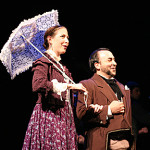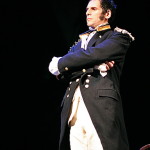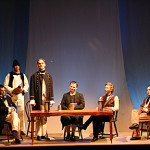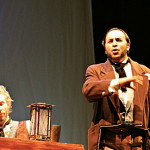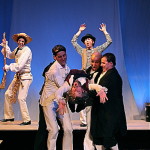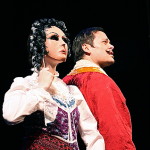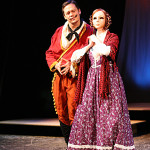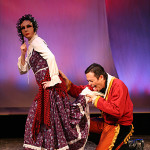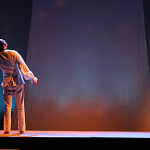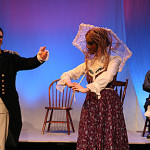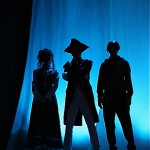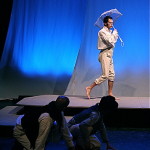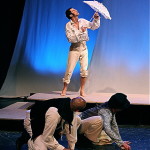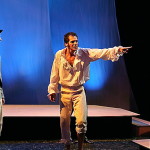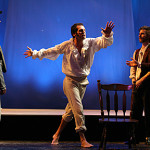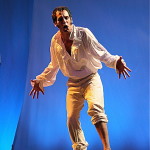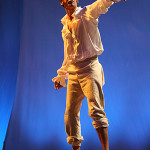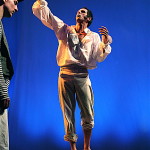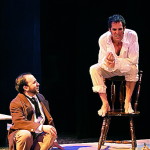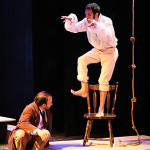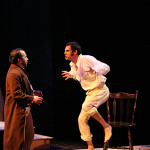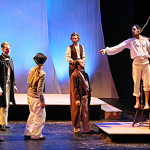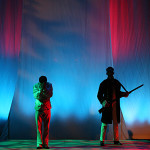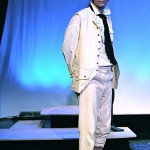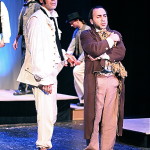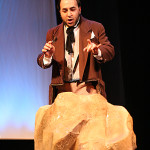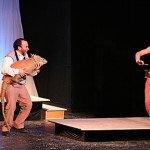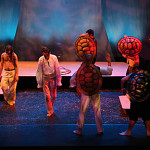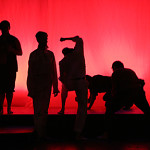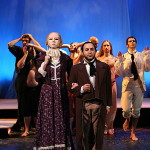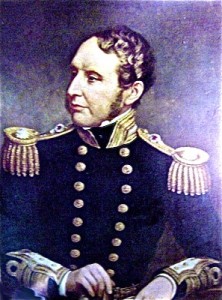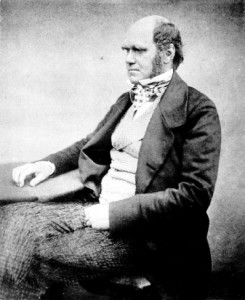Photos by Jane Stein
Above, from top: Sarah K. Lippman and Steve Ratazzi, foreground; same; T. Ryder Smith; ensemble; Timothy Reynolds and Steve Ratazzi; ensemble; Sarah K. Lippman and Joshua Spafford; same, same; T. Ryder Smith; T. Ryder Smith and Sarah K. Lippman; Sarah K. Lippman, T. Ryder Smith, Alok Tewari; T. Ryder Smith; Steve Ratazzi and T. Ryder Smith; ensemble; T. Ryder Smith and Brian Linden; T. Ryder Smith; T. Ryder Smith and Steve Ratazzi; Steve Ratazzi; Steve Ratazzi and Timothy Reynolds; ensemble; ensemble; ensemble.
Excerpts from the reviews
“An immense new play . . . [about] the voyage of the Beagle, the momentous five-year trip around the world which led a young Charles Darwin towards insights that became his theory of natural selection . . . Bromley takes us inside the heads of his title character and his play’s real protagonist, Beagle Captain Robert Fitzroy [and their] extraordinary experience together which transforms them irrevocably . . . Plays don’t often tackle this much . . . Bromley and his collaborators bring big ideas to life in diverse and startling ways . . . naturalism, fourth-wall breaking monologue, Shakespearean and Stoppardian wordplay, songs and sea chanteys. experimental deployment of masks and puppets . . . Downtown stalwarts Smith and Rattazzi take the central roles . . . I was constantly aware that I was watching a gigantic jigsaw puzzle . . . that had been painstakingly constructed to exemplify the idea that is also it’s subject.“ Martin Denton, nytheatre.com
Footnote
Above: Robert Fitzroy and Charles Darwin
Full reviews
NYTheatre.com, Martin Denton – Kirk Bromley’s immense new play “On the Origin of Darwin” is about journeys. The obvious one is the voyage of the Beagle, the momentous five year trip around the world which led a young Charles Darwin toward insights that became his theory of natural selection, from which eventually grew his epoch-making notions about evolution, ideas that genuinely changed the world, or at least the way that humans view it. But as if that weren’t enough for a play to consider, Darwin takes us on other kind of journeys. How do encounters with the exotic and the unknown shape a man? What happens when a lifelong dream collapses under the weight of reality? How does a man survive when the foundation of his faith is shaken? Bromley takes us inside the heads of his title character and his play’s real protagonist, Beagle Captain Robert Fitzroy, as their extraordinary experience together during that five years transforms them irrevocably. Plays don’t often tackle this much; Darwin is as exhausting to watch as it is exciting, requiring its audience to stay alert and on its toes as its scenes and situations spin out breathlessly and brilliantly. In Act One we’re immersed in the usurping bastard cultures of 19th century Argentina and Patagonia, where descendents of Spanish marauders and modern gauchos adapt and tame their environments in remarkable ways; and then in Captain Fitzroy’s ill-conceived effort to Christianize the natives of remote Tierra del Fuego, which ends catastrophically for his experiments’ guinea pigs and himself. In Act Two, we witness an insidious mutiny, the destruction of a love affair, and—in the play’s most thrilling and successful set piece—Darwin’s adventures on the Galapagos islands, which trigger the Big Idea that changes, well, everything. They’re all adventures worth recounting, and Bromley and his collaborators bring them to life in diverse and startling ways. Director Joshua Spafford keeps the pace relentless without ever sacrificing detail or thoughtfulness; all manner of presentation ideas—naturalism, fourth-wall-breaking monologue, Shakespearean and Stoppardian wordplay, songs and faux sea chanteys, experimental deployments of masks and puppets—are trotted out both to keep us alert and to reinforce the drama’s key theme of animate objects adapting to circumstances. Designers Jane Stein (sets, puppets, masks), Karen Flood (costumes), and especially Paul Frydrychowski (enormously evocative lighting) have supplied a stunning visual environment for the play; composers John Gideon Grossman and Mark Hollmann give it a lovely and varied soundscape. (It should be noted emphatically that the contributions of these artists are exemplary, particularly given the budgetary limits of an off-off-Broadway production: they have met the challenges of Darwin‘s humongousness with real ingenuity.) Ten actors fill out the story as if they were ten dozen. Downtown stalwarts Steven Rattazzi (Darwin) and T. Ryder Smith (Fitzroy) take the central roles; they are both newcomers to Bromley’s work and it’s encouraging to see them in it, signaling sure growth for actors and playwright both. Veteran Bromley collaborators Bob Laine, Hank Wagner, Sarah K. Lippmann, and Spafford do their customary excellent work, with Laine managing to be both sympathetic and foolish as a recalcitrant missionary, Spafford enormously funny as a suspicious Argentinian called Señor Chilito, and Wagner serving as the play’s antic, anarchic anchor as a sailor named Syms as well as our narrator. Brian Linden, Timothy Reynolds, Putnam Smith, and Alok Tewari round out the hard-working, high-energy ensemble. The script itself feels like a progression in the work of Kirk Bromley, which I have been following since the mid ’90s. The trademark eccentric brilliance is here, of course: extraordinary leaps and links; pyrotechnic language filled with complex and clever puns, double meanings, and obscure and/or made-up words. But in Darwin it’s all in service of a bigger idea instead of just on display for its own sake; I couldn’t catch all of the subtle and careful ways that each of Bromley’s selections here is (forgive the pun) the natural one—but I was constantly aware that I was watching a gigantic living puzzle, or maybe a Rubik’s cube, that has been painstakingly constructed to exemplify the idea that is also its subject. Form is being matched to content, in other words; when I read On the Origin of Darwin, I will look forward to mapping out this notion and, I expect, being dazzled anew by Bromley’s artistry. 12-9-04
AnniBruno.com – Kirk Wood Bromley’s newest venture is a historical fiction play, based on the life and world journeys of Charles Darwin. Not as dull as you’d think. A fascinating, important man, but I never thought he’d be appropriate fodder for a play. Despite the fact that there is no real plot-line or antagonist (apart from Creation vs. Evolution), the show has real potential. It needs work, of course, but it is still in its workshop stage. I loved the cast. Loved. So well cast. Steven Rattazi is brilliant as the unsure, emotionally vulnerable Darwin. T. Ryder Smith, as Captain Fitzroy, is Tony-worthy (here’s to hoping) in his decent into madness in Act Two. Sarah K. Lippman is smart and supportive of her fiance on his journey, and acts as a sounding board for Darwin’s thoughts and ideas as he writes to her from all over the world. The role isn’t that interesting but she does a good job with it. My friend Timothy Crown McReynolds as the artist, Augustus Earle was creepy and effective. Also very gay. Which he is not. Good acting job. Hank Wagner as the ship’s smart ass/Shakespearian style clown was Cockney and quick and wonderful. Bob Laine does a fantastic job as the ship’s priest (Richard Matthews). His character arc is very clear, as he degenerates from a hopeful man of God to one destroyed. The rest of the cast is equally strong. Bromley created these characters all on real people. He needs to do more to make them interesting. I think he’s trying to stay true to history, but one of Bromley’s strongpoints is his ability to make fascinating, fictional characters. He needs to bring more of his usual wacky eccentricity to these real people. Joshua Spafford’s direction is clean and accessible. He does a great job keeping things physical and interesting even in the show’s most “talky” scenes. Spafford does a cameo, as Senior Chillito. He steals the show in his comic blunderings as a self-proclaimed ladies man in Buenos Aires. I did not like the fact that Spafford chose not to bow with the cast. Yes, the director normally doesn’t, but he was also a cast member. It was odd. My main issue with the show is its length. With a late start and long intermission, we didn’t get out of the theatre until 11:10. I really hate being told a vastly incorrect running time on a show. Some scenes in act one could use some extensive cutting, but Kirk’s poetic script is hard to scale down, as much of the dialogue is pretty beautiful. He really is like “Shakespeare on mushrooms.” Especially in the captain’s crazy scene. I think more could have been done with Darwin’s visiting of other cultures. It seemed like too much time was spent on the ship, the men all talking and philosophizing, and not enough time was spent on their experiences with the characters they meet around the world. Big issue with Bromley’s choice to throw in Lippman at the end as “The Playwright.” She comes out and talks to Darwin as a way to summarize. However, Wagner’s character had been acting as the narrator up to that point. This breaking of the fourth wall convention didn’t work in this context. There is a lot that can be done with this show to improve it. But what a brilliant start. Even without any sex or death, a play about the theories of sex and death can be equally fascinating!
[previous] [next]

